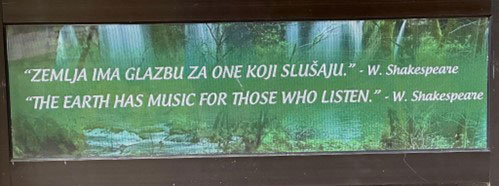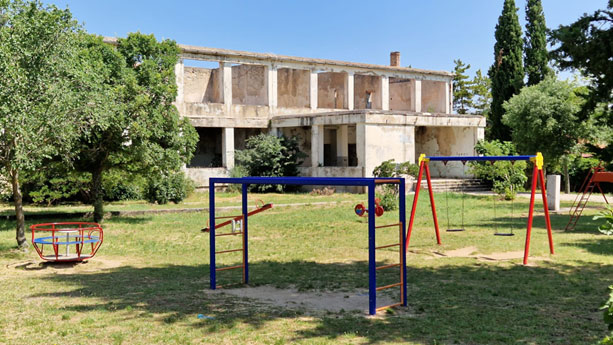As we meandered our bikes along the backroads of Zagreb and Split, Slunj and Korenica, we were in the vicinity of Bosnia and Herzegovina, where much of the Croatian War of Independence was fought from 1991-1995. Homes and the people living in them were hit hard by artillery and sustained unimaginable losses through the death and destruction of their families. It was painful to witness the remnants of those horrors, horrors which so often we only see or hear about on the news as “another world story”.
And yet, we were biking by a playground outfitted with brightly colored equipment sitting in the middle of a war zone’s aftermath. Looking up from the swing set, we saw a building scarred with bullet holes and gutted down to its studs, but also there was sunshine. And scattered in the grasses were flowers growing against all odds. Such amazing resilience.
As we hiked in the parks later that same day, someone commented on a thing we’d passed, sorry that they’d missed the view. Our guide Bruno said simply, “we’re just going to the future, not the past”. This is perspective that serves one well while growing up in wartime, but also a perspective that kept us focused on the present and the future- where we were, and where we were yet to be.
Later that day, when we reached the National Park’s Cafe, we were met with Shakespeare’s words on the side of the building:

Again, I thought about resilience, and perspective. I thought about how as a country, Croats have rebuilt and celebrated in their strength and solidarity. Shakespeare’s words (“for those who listen”), tie seamlessly with Jill Bolte Taylor’s concept of a brain huddle (taking time to move from fixing and fear, to jubilation and connection). It takes some practice, but it’s always worth the music.
A couple of weeks later, while talking with our taxi driver as he drove us to the airport in Dubrovnik, I impulsively asked him if he was old enough to remember the war. He told us that his father was killed in the war, and that his mother alone had raised him and his brother, who is now studying in the U.S. He told us that 80% of the buildings in Dubrovnik had been destroyed but were now rebuilt, and it was again a thriving city. He was earning a living and felt that his life was good.
Immediately, I thought back to the playground.
And scattered in the grasses were flowers growing against all odds.

